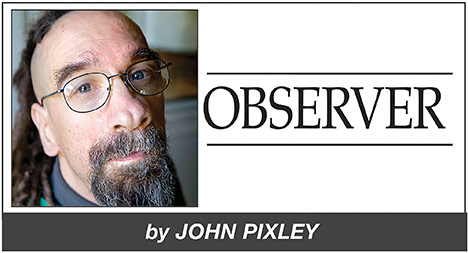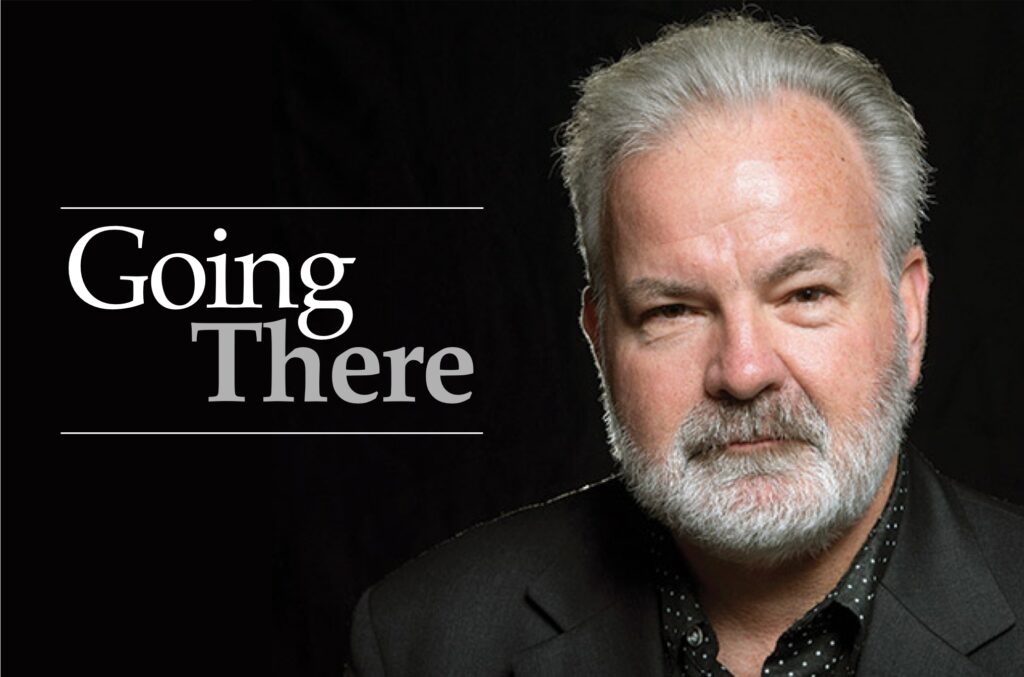After a time of quiet, a time to reach out
by John Pixely
I have pandemic guilt. Or do I?
Over the last 20 months or so — yes, we’ve been at this life-turned-upside-down slog together, as we’ve kept hearing, for nearly two years — I’ve heard and read countless stories about what people have been doing, and have accomplished, during the pandemic.
Apparently, folks, at least those who trusted science and followed the health officials’ advice, got busy while holed up at home. They didn’t sit around playing tiddlywinks or doing nothing or just watching Netflix. Although plenty did watch Netflix, at least on the side, while doing something else.
Some did things, more often than not, new things, to pass the time, while others used the time for things, projects, that they had been meaning to do, things that they had wanted to do but never found the time. Now they had the time.
According to reports, in the first two or three months that COVID-19 kept us at home, some tried out sourdough starters and also learned to perfect pies and delicate pastries. Some embarked on long-dreamed-of home improvement projects and some taught themselves another language or how to quilt. Some wrote the novel they always thought of writing, some painted cards and mailed them to friends with thoughtful notes, and some wrote songs, made music videos, recorded albums.
I kept seeing these stories about all the things people were getting done, were accomplishing, during the pandemic. It was a bit like reading that Mozart completed something like five symphonies and a couple operas while he was a teenager.
It was hard not to feel like a slouch, like I was downright lazy, like I was wasting all this extra time that we had on our hands. It was hard not to feel guilty for not making good use of this time, for not being incredibly productive during this period away from our normal, too-busy lives, as forced and as unwanted as it was.
That there have also been thousands and thousands of people getting sick and so many of them dying, dying awful deaths alone in crowded hospitals, hasn’t helped.
But, then again, while I didn’t take on a grand project, while I didn’t spend this down time writing the great American novel, I wasn’t doing nothing. I was getting work done, important work on myself that I needed to get done.
The strange fact is that, in some sense, the pandemic didn’t interrupt what I saw as my normal, too-busy life. That had happened three years earlier when I had spinal surgery, which saved my life but left me far more disabled than I had already been. What was interrupted for me by the COVID lockdown was getting back to my life or, rather, a new life.
Right as I was getting into the swing of things, into the life that I was now to have, to find, to develop, I found myself back stuck at home, back in a state of convalescence.
Except, this time, I wasn’t alone. I wasn’t the only one stuck at home, in a state of limbo, if not convalescence. We were all suddenly set back, having to stop and put our lives on hold and try to make new sense of it.
“Welcome back!” proclaim the signs on the restaurants in the Village now offering indoor dining again. As if we have been away on a long journey.
Which we have. It may not have been a vacation, a fun road trip, a nice, relaxing getaway, but it was definitely a time away, a time apart, an adventure of sorts in which we started anew or saw things anew or learned the hard way to do so.
Now we find ourselves finding our way in a strange, wonderful world where going to a concert at the colleges is an absolute joy, but is a bit like going through security at an airport in order to attend, having to show photo ID and proof of vaccination in addition to having to fill out a health attestation form saying that one doesn’t have COVID symptoms and hasn’t been exposed to any.
We also find that things have been done during this fallow time, that new seeds have been found and are now being planted and nurtured. We saw this in the new awareness of racial inequality and injustice and subsequent unprecedented protests after the horrific police killing of George Floyd — an awareness made more possible with so many of us at home with more time to see the news and to think. There are efforts to keep these new senses and sensibilities alive, to nurture them and keep them going after the pandemic is over.
Things have been percolating at Claremont Change, the organization started by recent Claremont High School graduates Josue Barnes and Noah Winnock in the wake of the Floyd killing to promote diversity and justice in Claremont. Barnes and Winnock are now leading a series of free workshops on how to detect and respond to rhetorical devices such as gaslighting and exceptionalism. These workshops are taking place on Zoom, mostly every other Monday evening, and more information can be found on Claremontchange.org.
The local Bahais have also been busy, germinating a hope and working to make it real. In the wake of their Zoom series of Claremont Speaks Black conversations, spurred on by the activism following the Floyd murder, featuring Black residents of Claremont sharing their experiences of being Black in Claremont, the Bahais are expanding on these dialogues in an effort to further promote diversity and justice in Claremont. They recently led an in-person dialogue at Blaisdell Park on how to get more people involved in the pursuit of racial equality and justice. About two dozen people participated, and it seemed like the beginning of something good taking root. For further information on how to get involved, contact Claremontlsa@gmail.com.
Then there is the Newcomer Access Center and its effort with the Claremont Friends Meeting (Quakers) and others to offer housing, at least temporarily, to Afghan refugees. The NAC is a group started by Pilgrim Place residents some time ago wanting to assist those seeking asylum in this country. With people now fleeing Afghanistan, there is now a need for this.
The Claremont Quakers, in conjunction with the Claremont Homeless Advocacy Program, had been hosting homeless people overnight at the meetinghouse, but that had to end when the pandemic struck. With the space now available, the Quakers offered, when needed, to have Afghan families stay there for a few weeks at a time while they get on their feet and find more permanent housing. The Claremont School of Theology is also helping out, with office space for the NAC as well as possible housing. All is at the ready when an Afghan family needs shelter here.
Indeed, after this time of quiet and isolation, there are efforts to reach out and make Claremont a more welcoming, more just place. That’s nothing for any of us to feel guilty about.










0 Comments